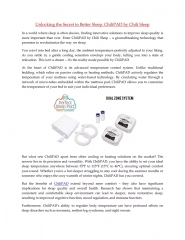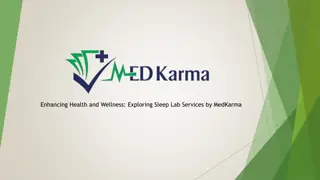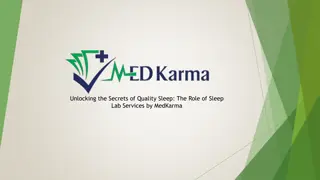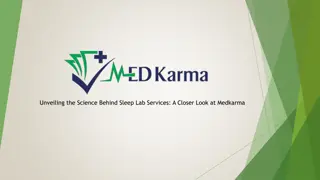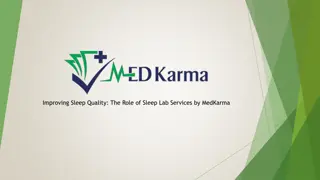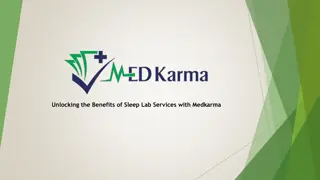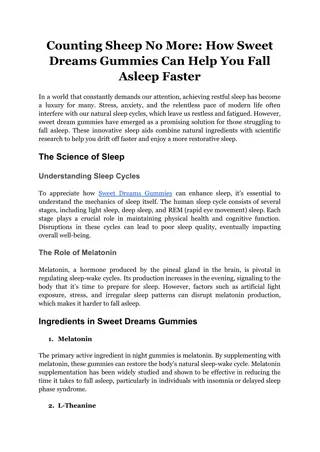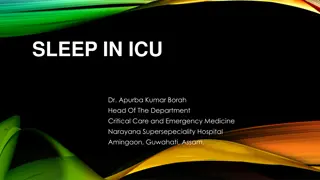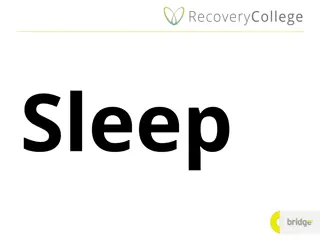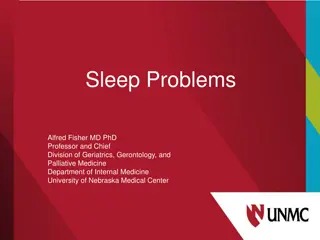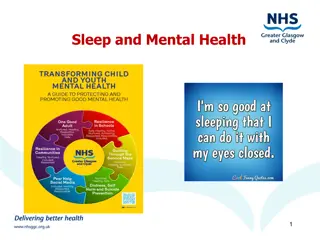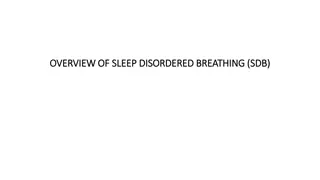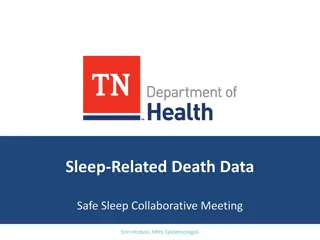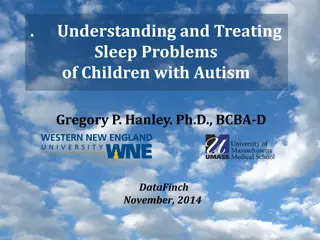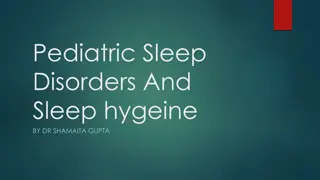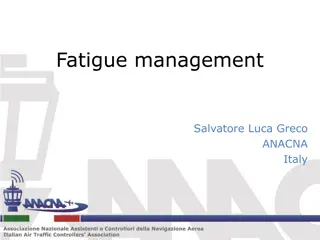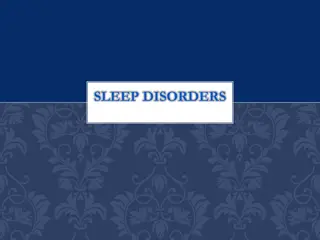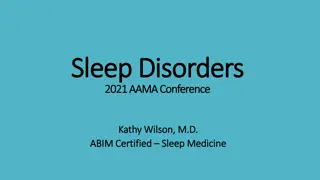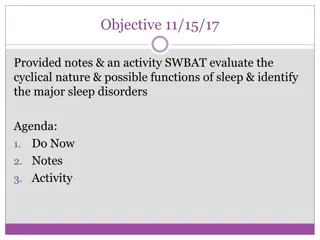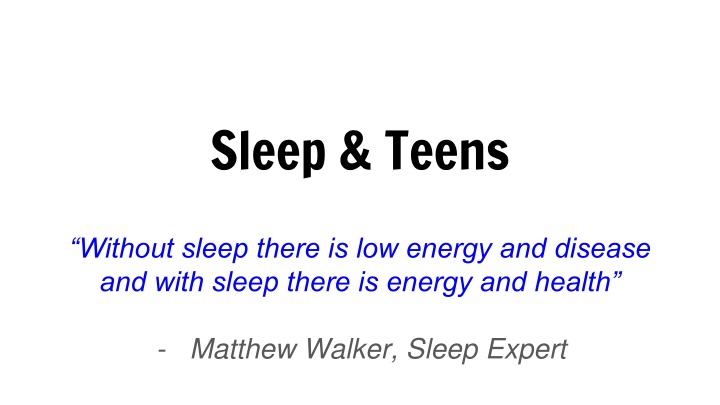
Teen Sleep Habits and Impacts: Insights from Experts
Discover important insights on teen sleep habits, energy levels, and health from sleep expert Matthew Walker. Explore the significance of adequate sleep for teens, common sleep issues, and tips for improving sleep quality. Engage in thought-provoking questions and discussions around sleep duration, bedtime routines, caffeine consumption, and the physical and mental effects of sleep deprivation.
Download Presentation

Please find below an Image/Link to download the presentation.
The content on the website is provided AS IS for your information and personal use only. It may not be sold, licensed, or shared on other websites without obtaining consent from the author. If you encounter any issues during the download, it is possible that the publisher has removed the file from their server.
You are allowed to download the files provided on this website for personal or commercial use, subject to the condition that they are used lawfully. All files are the property of their respective owners.
The content on the website is provided AS IS for your information and personal use only. It may not be sold, licensed, or shared on other websites without obtaining consent from the author.
E N D
Presentation Transcript
Sleep & Teens Without sleep there is low energy and disease and with sleep there is energy and health - Matthew Walker, Sleep Expert
Bell Ringer - Answer these questions as you come in 1. How many hours of sleep did you get last night? 2. How many hours of sleep do you typically get on a school night? Weekend night? 1. What do you typically do the 30-60 minutes before going to bed? (aka: your bedtime routine) 2. Do you consume caffeine? (coffee, tea, soda, chocolate, energy drinks, etc.) If so, what time during the day and how much? 1. Do you find that you find that when your head hits the pillow your mind often starts worrying about things? 1. What is ONE thing you can do tonight to get more sleep or improve the quality of your sleep?
Without talking, please stand in order based on how many hours of sleep you got last night Least Most Round to the nearest hour
Raise your hand if this is a typical night for you during the week?
How do you physically feel when you dont get enough sleep?
How do you mentally or emotionally feel when you don t get enough sleep?
For those of you under 7 hours, tell us some reasons why?
For those of you 8 hours or over, tell us how you do it?
Sleep for infants is non- negotiable, so why is it not for teens?
What percent of students in the state of Virginia do you think get less than 8 hours of sleep?
Sleep Myth or Fact
It is ok if teens only get 7 hours of sleep each night.
Your genetic code determines whether you are a morning person or a night owl
Deep REM sleep is proven to enhance my problem-solving ability
If you are tired, consuming caffeine after lunch time likely will not interfere with one s sleep at night
If I am tired, taking a nap is always beneficial for me.
It is a good idea to pull an all-nighter if you are not ready for your test the next day
The All-Nighter A Good Idea? No! No! Impacts hippocampus 40% reduction in memory The difference between An A and an F
It is a good idea to sleep in later on the weekends to catch up for lost sleep during the week.
Sleep Bulimia Binge sleep on the weekends (sleep a lot) And purge on the weekdays (sleep less)
There is no banking or credit system for sleep You cannot bank sleep Or sleep off a debt
After 16 plus hours of being awake, my body responds similarly to being legally drunk
Being awake 16-20 hours is similar to being intoxicated (.08 BAC)
What Happens to Your Body & Brain if You Dont Get Sleep What Happens To Your Body And Brain If You Don't Get Sleep Sleep expert Matthew Walker breaks down the many effects of sleep deprivation on your brain and body. Following is a transcript of the video. Matthew Walker: My name is Matthew Walker, I am a professor of neuroscience and psychology at the University of California, Berkeley, and I am the author of the book "Why We Sleep." We certainly know that a lack of sleep will actually prevent your brain from being able to initially make new memories, so it's almost as though without sleep the memory inbox of the brain shuts down and you can't commit new experiences to memory. So those new incoming informational emails are just bounced, and you end up feeling as though you're amnesiac. You can't essentially make and create those new memories. We also know that a lack of sleep will lead to an increased development of a toxic protein in the brain that is called beta amyloid and that is associated with Alzheimer's disease because it is during deep sleep at night when a sewage system within the brain actually kicks in to high gear and it starts to wash away this toxic protein, beta amyloid. So if you're not getting enough sleep each and every night, more of that Alzheimer's-related protein will build up. The more protein that builds up, the greater your risk of going on to develop dementia in later life. What are the effects of sleep deprivation on the body? Well, there are many different effects. Firstly, we know that sleep deprivation affects the reproductive system. We know that men who are sleeping just five to six hours a night have a level of testosterone which is that of someone ten years their senior. So a lack of sleep will age you by almost a decade in terms of that aspect of virility and wellness. We also know that a lack of sleep impacts your immune system. So after just one night of four to five hours of sleep, there is a 70% reduction in critical anticancer-fighting immune cells called natural killer cells. And that's the reason that we know that short sleep duration predicts your risk for developing numerous forms of cancer. And that list currently includes cancer of the bowel, cancer of the prostate, as well as cancer of the breast. In fact, the link between a lack of sleep and cancer is now so strong that recently the World Health Organization decided to classify any form of nighttime shift work as a probable carcinogen. So in other words, jobs that may induce cancer because of a disruption of your sleep rate rhythms. We also know that a lack of sleep impacts your cardiovascular system because it is during deep sleep at night that you receive this most wonderful form of effectively blood pressure medication. Your heart rate drops, your blood pressure goes down. If you're not getting sufficient sleep, you're not getting that reboot of the cardiovascular system, so your blood pressure rises. You have, if you're getting six hours of sleep or less, a 200% increased risk of having a fatal heart attack or stroke in your lifetime. There is a global experiment that is performed on 1.6 billion people twice a year and it's called daylight saving time. And we know that in the spring, when we lose one hour of sleep, we see a subsequent 24% increase in heart attacks the following day. Another question, perhaps, is what is the recycle rate of a human being? How long can we actually last without sleep before we start to see declines in your brain function or even impairments within your body? And the answer seems to be about 16 hours of wakefulness. Once you get past 16 hours of being awake, that's when we start to see mental deterioration and physiological deterioration in the body. We know that after you've been awake for 19 or 20 hours, your mental capacity is so impaired that you would be as deficient as someone who was legally drunk behind the wheel of a car. So if you were to ask me what is the recycle rate of a human being, it does seem to be about 16 hours and we need about eight hours of sleep to repair the damage of wakefulness. Wakefulness essentially is low-level brain damage. Read more: http://www.businessinsider.com/sai FACEBOOK: https://www.facebook.com/techinsider TWITTER: https://twitter.com/techinsider INSTAGRAM: https://www.instagram.com/tech_insider/
Why do we need Deep Sleep? Clears out waste - Sewage network clears out beta amyloid, then refreshed Learning & Memory - prevents you from forgetting, cleans out short-term memory Emotions get reset Regulates pre-frontal cortex...not enough sleep, you are more emotional and less rational
Why do we need Deep Sleep? Best form of blood pressure medication Regulates metabolic levels (i.e. blood glucose)...those who got one week of 5-6 hours of sleep show pre-diabetic state Crucial for reproductive health Stimulates Human-Growth Hormone Regulates appetite and weight...food consumption (imbalance in lecithin and ghrelin Hunger Hormones Immune system - clear link to cancer...200-300% more likely to get a cold than people who get 8 hours
Learning and Memory - Why should you care? Sleep is critical to be ready to learn BEFORE learning When you get enough sleep your brain is like a dry sponge ready to soak up new information
Learning and Memory - Why should you care? Sleep is critical AFTER learning It s like hitting the save button - creates connections Replays info learned while sleeping (10-20x faster) Strengthens neural circuits Imprints the memory (transfers to Cortex of brain)
Learning and Memory - Why should you care? Sleep interconnects NEW and OLD memories Information collides Updates your neural network Key to PROBLEM-SOLVING
5 Tips for Falling Asleep Quicker Five Tips For Falling Asleep Quicker Sleep expert Matthew Walker describes the perfect conditions for falling asleep quicker. Following is a transcript of the video. Matthew Walker: My name is Matthew Walker. I am a professor of neuroscience and psychology at the University of California Berkeley and I am the author of the book, "Why We Sleep." What are things that we can all do tonight and in the future to start getting better sleep? Well, beyond carving out a non-negotiable eight-hour sleep opportunity, there are probably at least five things that we can do. The first is that we have to try and maintain regularity. And if there's one thing that you take away from this, it would be going to bed at the same time and waking up at the same time, no matter whether it's the weekday or the weekend. Even if you've had a bad night of sleep, still wake up at the same time of day and reset. The second thing is that we are a dark-deprived society in this modern era and we need darkness in the evening to allow the release of a hormone called melatonin. And melatonin helps the healthy timing of our sleep. So try to dim down half the lights in your home in the hour before bed. Stay away from screens, especially those LED screens they emit blue light that actually puts the breaks on melatonin. And those blue-light emitting devices fool your brain into thinking that it's still daytime, even though it's nighttime and you want to get to sleep. The third key ingredient is to keep it cool. Many of us actually have a bedroom that's too warm in terms of temperature. So an optimal temperature is about 68 degrees Fahrenheit or about 18 and a half degrees Celsius. And the reason is that your brain and your body need to drop their core temperature by about two or three degrees Fahrenheit to initiate good sleep. And that's the reason why you'll always find it easier to fall asleep in a room that's too cold than too hot. So having a cool room actually takes your brain and body in the right temperature direction to get good sleep. The fourth critical factor is actually avoiding alcohol and caffeine. Unfortunately, this makes me deeply unpopular but alcohol is perhaps the most misunderstood drug when it comes to sleep. People think that it helps them fall asleep. That's not actually true. Alcohol is a class of drugs that we call, "the sedatives." And what you're doing is just knocking your brain out. You're not putting it into natural sleep. We also know that alcohol will fragment your sleep. So you'll wake up many more times throughout the night. And alcohol is also a very potent chemical for blocking your dream sleep or your rapid eye movement sleep. Caffeine is also a problem. Many of us know that caffeine can keep us awake. It's an alerting chemical, it's a stimulant in terms of a class of drugs. But few people know that even if you can have a cup of coffee after dinner and you fall asleep fine and maybe you stay asleep, the depth of the deep sleep that you have when there is caffeine within your brain isn't as deep as when you've abstained from that cup of coffee after dinner. So as a consequence, you wake up the next morning, you feel unrefreshed and you don't remember waking up or having a difficult time falling asleep but now you find yourself reaching for two or three cups of coffee in the morning and you develop this dependency, this addiction cycle. The fifth and final tip for better sleep is to not stay in bed awake. So if you haven't fallen asleep within 20 or so minutes or you've woken up and you're finding it difficult to fall back asleep, don't stay in bed awake. The reason is that your brain very quickly starts to learn the association between your bed being about the place that you're awake rather than your bed being about sleep. So the advice is to get up, go to another room and in dim light, just read a book. No screens, no email checking, no food. And only when you feel sleepy should you return to bed and that way you can then actually re-learn the association between your bedroom being about the place of sleep rather than being awake. I should also note that some people don't like the idea of getting up and going out to a different room if it's dark and they're warm in bed. An alternative is actually meditation. Meditation has been demonstrated in clinical trials to help people just relax the body, calm down the fight-or-flight branch of the nervous system that can happen when we wake up in the middle of the night and we have that Rolodex of anxiety thoughts. And by meditating, you can start to quiet the mind as well as the body and that also helps you fall back asleep more easily. Read more: http://www.businessinsider.com/sai FACEBOOK: https://www.facebook.com/techinsider TWITTER: https://twitter.com/techinsider INSTAGRAM: https://www.instagram.com/tech_insider/
Strategies for Better Sleeping 1. Must carve out 8 Hours. Period. This is Non-Negotiable 2. Regularity - Go to bed and wake up at the same time 3. Keep it cool - body needs to drop about 2 degrees before it sleeps. 68 degrees is pretty ideal. Hot baths help 4. Darkness - Must have to release melatonin. Think about lights in room and lights from screen. 5. Do not stay in bed if awake for more than 20 mins 6. No caffeine in the afternoon. Avoid alcohol in evening. Depth of sleep is significantly affected
How can you make 8 hours of sleep non- negotiable?
Sleep Rap It's a fact, most teenagers do not get enough sleep. This song was created to inspire my students to value their sleep and make it more of a priority to improve their health. Enjoy!

